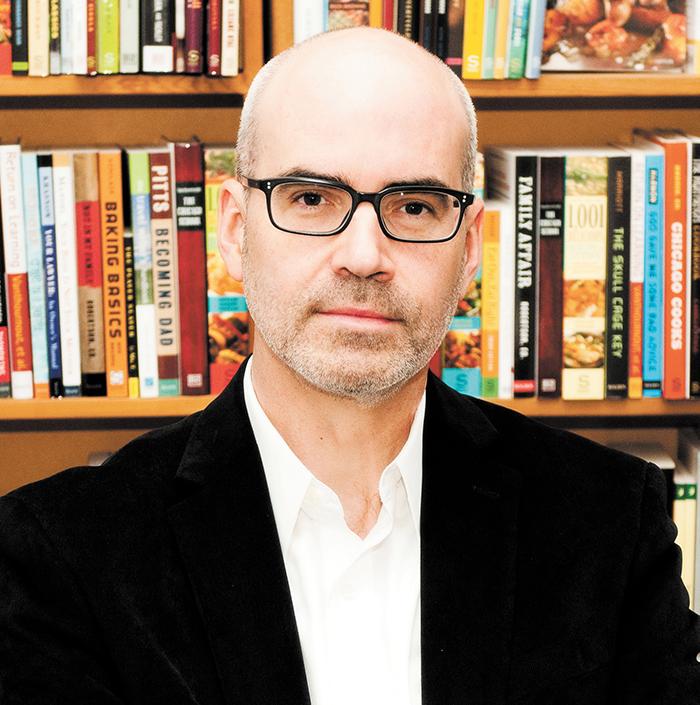The Chicago Area Publishing Company That Discovers Overlooked Talent
Daniel Hautzinger
November 14, 2019

Agate Publishing is an unexpected gem in an unlikely place – or, more true to its name, a semiprecious stone. Its offices are unassumingly located on a quiet neighborhood corner amongst residential houses in Evanston. The Chicago area is far from a hub of trade publishing: according to Agate’s founder and president, Doug Seibold, the Bay Area, Boston, and the Twin Cities all have larger publishing industries, and that’s not even mentioning New York City, the dominant center of the industry. Like its namesake – agate is not just a rock but also a print term referring to the small type used in box scores, ads, and other places – it is “fine print” hidden away.
And, just as the company itself is easily overlooked by the casual reader, it often finds and publishes writers missed by the larger publishing industry. “Our role in the ecosystem that is American publishing is to find opportunities where bigger companies can’t or won’t,” Seibold says. “What I think is valuable about being here [in the Chicago area] is that I’m less subject to the kind of herd mentality that very understandably can befall people in the center of an industry. I think it does make it harder for them to see things outside of that community, which creates opportunity for companies like mine.”
Agate has helped launch the careers of several nationally acclaimed authors. “You could call it prospecting,” Seibold says. “‘How do you create or find opportunity for people that aren’t getting it?’ And I think that’s what a company of our size is about.”
Agate published Where the Line Bleeds, the debut novel of Jesmyn Ward, who has since won two National Book Awards. “I’m still astonished that other publishers didn’t see what, to my mind, was like a bill of large denomination lying on the ground – Jesmyn’s light was not under a bushel,” Seibold says. Kiese Laymon, whose memoir Heavy garnered praise from across the country last year, published his debut novel, Long Division, and an essay collection, How to Slowly Kill Yourself, with Agate.
The very first book Agate published, back when Seibold was running the company from his basement, was Sexual Healing, the first novel by the journalist Jill Nelson. “Jill told me, ‘I have a book in a drawer that nobody in New York wants to publish,’ ” Seibold recalls. Sexual Healing ended up being successful enough to “get Agate up and moving right from the jump,” in Seibold’s words.
Ward, Laymon, and Nelson were all published on Agate’s Bolden imprint, which focuses on African American writers. When he started Agate in 2003, Seibold felt that both African American readers and authors were being neglected. “My approach has been, ‘How do I determine what other people want to read, especially people who aren’t getting things that are really marketed to them?’ ” he explains. “It was clear that the major media centers on the coasts just were not attentive either to the audience or to the artists that were creating that work. It was appalling to see the oversight there.”
 Agate Publishing president and founder Doug Seibold. Photo: Andrea BauerAnother area that Seibold feels is being overlooked is writing by Midwestern authors on Midwestern topics, which is covered by Agate’s Midway imprint. “I feel like there is a perennial neglect or devaluation of work that originates between the mountain ranges,” he says, even though “the work is not necessarily limited audience-wise.” (Midway published a book in collaboration with WTTW, 10 Buildings That Changed America, as a companion to the Geoffrey Baer series of the same name.)
Agate Publishing president and founder Doug Seibold. Photo: Andrea BauerAnother area that Seibold feels is being overlooked is writing by Midwestern authors on Midwestern topics, which is covered by Agate’s Midway imprint. “I feel like there is a perennial neglect or devaluation of work that originates between the mountain ranges,” he says, even though “the work is not necessarily limited audience-wise.” (Midway published a book in collaboration with WTTW, 10 Buildings That Changed America, as a companion to the Geoffrey Baer series of the same name.)
Midway is responsible for some of Agate’s biggest recent releases: Mark Larson’s Ensemble: An Oral History of Chicago Theater; Melissa Isaacson’s State: A Team, a Triumph, a Transformation; and, perhaps the best-received of them all, the Michelin-starred Chicago chef Iliana Regan’s memoir Burn the Place, which is the first food book to be long-listed for a National Book Award since Julia Child’s Julia Child & More Company in 1980. (The National Book Award winners will be announced on November 20.)
“She is a creative force,” Seibold says of Regan, whom he approached about writing a book after following her story for several years and learning that she had a creative writing degree. “She is a volcano of expression and creativity. I mean, she’s tapping a deep magma, right down in the core.” Seibold doesn’t often edit books any more, given the scope of his business, but he chose to edit Burn the Place.
Agate has experience with food-related titles. It has published Chicago-related cookbooks such as The Hoosier Mama Book of Pie and The Eli’s Cheesecake Cookbook on Midway, and also has a whole imprint called Surrey, which it purchased in 2006, that is dedicated to food. In fact, Seibold says that Agate’s most successful author overall is Anupy Singla, who has written several cookbooks about Indian food for Agate Surrey. (Seibold says that the most successful book Agate has ever published is the children’s book Crown: An Ode to the Fresh Cut by Derrick Barnes, which won both Newberry and Caldecott honors.)
So Regan, as a first-time Chicago author writing about food and a life in the Midwest, fit Agate well. Furthermore, her book deals with another of Seibold’s – and Agate’s – interests: work, which is covered in part by another Agate imprint, B2, that focuses on business and economics.
“One of the things I love about Burn the Place is the way that it talks about how somebody finds expression in their professional life, and I am really interested in that subject for everybody,” Seibold says. “I love what I do, and I love work. And I think work is an endlessly fascinating subject. I think it partly is fascinating because there are so many people who haven’t found what they’re looking for from it or in it, so many people who are hostile or inimical to it.”
That love of work is an oft-celebrated aspect of a mythologized Chicago, the so-called “city that works.” Agate is more than a regional publisher, no matter what the industry in New York may think, but it nevertheless is grounded in the culture and ethos of Chicago.
This city isn’t such an unlikely place for a publishing company like Agate, after all.







